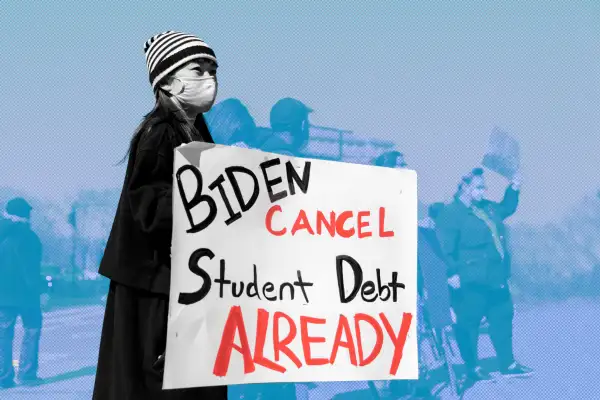Is Student Loan Forgiveness Finally Coming? Here's What We Know for Sure

Millions of Americans have gotten used to not making payments on their student loans during the pandemic. Now, they're anxiously awaiting a signal from President Joe Biden on whether the government will forgive their debt for good.
The latest development in the will-he, won't-he saga happened Monday, when some members of the Congressional Hispanic Caucus emerged from a meeting with Biden and said the president seemed inclined to take action on debt relief. Rep. Nanette Barragán, D-Calif., told CNN Biden didn't commit to anything, but Rep. Tony Cárdenas, D-Calif., told The New York Times that "he’s looking to do something that we would very much like, and he’s hoping to do it soon."
If those comments seem vague, that's likely intentional. The Biden administration has been coy for months about what, if anything, it's planning to do. Biden has long said he wants to avoid tapping his executive authority to mandate student loan cancellation; instead, he wants Congress to pass legislation on it.
To be clear: As far as the public knows, Biden has not yet made a decision on whether to use his powers to broadly cancel student debt.
But borrowers are hopeful, advocates are loud, and remarks from officials like White House Press Secretary Jen Psaki and Chief of Staff Ron Klain are generating near-constant speculation. Even The Washington Post called Monday's meeting Biden's "strongest indication yet" that forgiveness could be on the horizon.
Here's a quick rundown of everything we know for certain about student loan forgiveness:
The Biden administration announced earlier this month that it was extending the pause on federal student loan payments, interest and collections through Aug. 31. The moratorium, which has been in place since the start of the COVID-19 crisis, was previously set to expire May 1.
In a statement, the Education Department said it was going to use the extra time to "continue to assess the financial impacts of the pandemic on student loan borrowers and to prepare to transition borrowers smoothly back into repayment."
Not everyone was happy with the new deadline. Prior to the announcement, some 90 Democrats had sent Biden a letter demanding he extend the pause at least until the end of the year — as well as cancel "a meaningful amount" of debt. On the other side of the aisle, some Republicans had pushed back against another extension. So, depending on who you talk to, Biden either went too far or not far enough.
When will Biden make a decision on canceling student loan debt?
This summer, possibly. In an April 15 episode of the podcast Pod Save America, White House Press Secretary Jen Psaki confirmed that executive action on forgiveness was "still on the table." But she said the Biden administration has to first determine whether to extend the student loan moratorium past Aug. 31 (which, by the way, is just before the midterm elections).
Although the economy is strong, Psaki said, the president is aware "costs are too high" given the ongoing inflation situation. If not having to pay back student loans "can help people ease the burden of costs in other parts of their life, that's an important thing to consider," she added.
"Between now and Aug. 31, it's either going to be extended or we're going to make a decision ... about canceling student debt," Psaki said.
She went on to again emphasize that Biden would prefer to receive a bill from Congress because of the permanence a law offers.
"[He'd] sign it tomorrow. You can all come. You're invited to the South Lawn; we'll sign it; we'll celebrate; we'll have drinks with the money we save. So that's another option," Psaki said. "But we'll consider it before the end of August."
As a candidate, Biden backed a proposal to forgive a minimum of $10,000 of federal student loan debt per person.
But we don't know where he currently stands. In the Monday meeting, "the president never mentioned an amount nor did the president say that he was going to wipe out all student debt," as Cárdenas told CBS News. (Cárdenas also said the Hispanic Caucus supports executive action to forgive at least $10,000 if Congress can't, or won't, pass a bill.)
As always, some of Biden's peers are urging him to take it a step further. Sen. Elizabeth Warren, D-Mass., has advocated for canceling up to $50,000 per borrower — and using executive action to do it. "With one stroke of his pen, President @JoeBiden can lift a crushing burden, unleash a new wave of entrepreneurship, and deliver results that will echo for generations to come," Warren tweeted recently.
While borrowers wait for updates, others are keeping an eye on the piecemeal debt relief policies coming out of the White House. To date, the Biden administration has forgiven more than $17 billion in student debt linked to roughly 725,000 borrowers.
More from Money:
Here's How Much Student Loan Borrowers Will Owe When Payments Restart
How 2 Years Without Student Loan Bills Changed the Game for America's Borrowers
Student Loan Pause Extension: Biden Confirms Payments Won't Resume Until September

